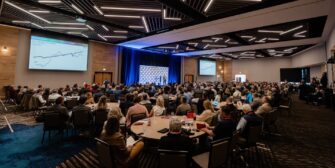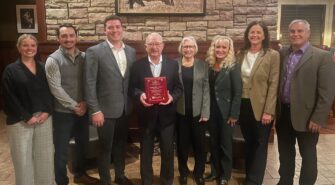Preview a ‘taste’ of family business at one-of-a-kind dinner
Recent News
Prepare to unlearn what you thought you knew about family business succession planning — and tackle the sometimes taboo topic of generational wealth — when an internationally known expert comes to Sioux Falls next month.
Dr. Thomas William Deans is an author and full-time professional speaker who has delivered more than 2,000 speeches in 28 countries on four continents.

He’s also the author of “The Happy Inheritor,” in which he describes how some people transfer wealth with great care and joy while others use their wealth to control and destroy relationships.
Deans will speak in Sioux Falls at Prairie Family Business Association’s annual conference, which runs April 30-May 1. His presentation, “A New and Unconventional Approach To Transitioning Your Family Business,” will offer a compelling and, for some, controversial approach to protecting family wealth while building families that remain close for generations.
“Tom is well known in the family business space around the globe,” executive director Stephanie Larscheid said.
“We’re thrilled for our families to learn from Tom and his experiences serving family businesses.”
Conference keynote sponsor Schwan Financial Group is sponsoring the speech, as well as providing copies of “The Happy Inheritor” for attendees.
“We are so happy and excited to hear directly from Tom. His vision, information and experience align with the processes and philosophy of Schwan Financial Group,” said John Schwan, founder and CEO of the firm, which is family-owned and operated.
We sat down with Deans for a preview of his message — and insight into the evolving world of wealth transfer.
Your book, “The Happy Inheritor,” which was released last year, is meant for families with a large amount of wealth and for families with smaller amounts of wealth. Describe how families of any wealth status will benefit from this subject.
Every single day in America, $3 billion in inherited. There’s a tsunami of wealth that is transitioning. At the same time we are setting a record for wealth, we are writing fewer and fewer wills. It’s estimated 137 million Americans do not have a will. Roughly 50 percent of Americans die and the family has to apply for a public trustee to administer the estate, and each state has a formula for dividing the wealth. It doesn’t matter if you have $100, $100,000 or $100 million, the same formula applies, and it’s likely not going to mirror the intentions of the person who has died. And that’s highly unlikely in the context of a family business, where a state formula often puts siblings in business together as equal partners and applies a formula in a rigid way. I’m estimating half of all lawyers in Sioux Falls don’t have a will. Four U.S. presidents died without a will. This subject is fascinating, and I get into some of the explanation for why really smart people do really dumb things.
The main topic in this book is a family meeting. Why are you such a big proponent of facilitated family meetings?
The opposite of a family meeting is — I’ll give you a hint — silence. Secrets. If you’re not talking, you’re not talking. So we have people who maybe don’t have a will, or they do but they draft it in isolation without conversation or participation of heirs. Family meetings are how successful families prepare wills and facilitate wealth. It’s meant to prepare the rising generation for what is heading their way. It can be an emotional and difficult and awkward subject. If it was easy, everyone would have a will and talk about it. But the senior generation is not having family meetings or sharing estate planning documents because of what they learned as children. The preceding generation views conversations about money as rude, and the rising generation was encouraged to not talk about it because that was defined as clamoring for wealth.
When you build culture around wealth in motion, these are successful families not leaving it to a wish and a prayer and good luck. They’re working on it. I talk about how difficult it is to create wealth, protect wealth, and the most difficult thing is how to transition wealth. It’s even harder than making it. Anything that produces value requires work, and the transition of wealth is no different, and the family meeting is where the work is done.
Sometimes, the next generation has difficulty getting their family to commit to a family meeting. What is an example or two of how next-gens can lead the family into a family meeting?
Often, the rising generation really wants clarity. They’re moving into their 30s and 40s, and their parents are in their 50s, 60s or 70s, and there’s a lot of ambiguity around how the business will transition. It might sound weird, but I advocate the rising generation writing their will, writing their power of attorney for finance and health care, with their parents. The children are actually educating their parents. It’s kind of out of order, but decent, kind, empathetic parents will reciprocate, and it will start with a family conversation around the transition of wealth.
With the rise of AI and some business aspects able to be automated, the role of a family meeting facilitator is more important than ever. This is a piece of servicing a family business that cannot be automated. Talk about advisers differentiating themselves through effective family meeting facilitation.
I will paint an aspirational picture of families who work with advisers to gather the family and build a transparent, inclusive meeting agenda. I deliver presentations to hundreds of family meetings. In one, the family meeting was chaired by a 15-year-old girl because they rotate the chair among the family. It’s the place where power and control are slowly relinquished through conversation. The family meeting becomes the centerpiece that prepares the next generation. And in the absence of a third-party facilitator, conversations tend to devolve and everyone reverts to their 14-year-old self. The third party in the room completely changes the dynamics. This person is taking minutes, recording action items and driving the follow-up. If people say they’re going to get a will done, make sure it’s provided at the next family meeting.
Family businesses learn as well from success stories as they do from failures. Tell us an example of how a family or business fell apart because of not having a family meeting.
A good example is a successful business owner has three kids: One is working in the business, two are outside. The owner has talked about a will but doesn’t have one. There’s no liquidity to pay the taxes triggered on death. The state formula puts the children in business together. The children outside the business want cash from the brother who’s in the business, so he reaches into the business for cash flow, and it’s not there, and the business collapses and dies in the hands of the second generation. They have to wear the public shame of blowing up the parents’ business because it’s perceived they didn’t work hard enough, and it’s a really a missed play because the business was designed to blow up. The family was designed to ruin itself because of indifference to base estate planning.
There also are stories about secrecy keeping the rising generation off guard. You have people in their 60s that have been told “Relax, we’ll make everyone whole, and it will all work out.” And then it doesn’t, and they haven’t saved and invested for their own retirements. They’ve expected an inheritance because they’ve been told there’s one, and they find out there isn’t, and they run out of time.
What other topics do you plan to address at the Prairie Family Business Association annual meeting?
Another major theme we’re seeing is family wealth transition prior to death — or living gifts. It’s a really interesting moment because the oldest baby boomers turn 76 this year and are the most successful generation in history. So they’re sitting on a mountain of wealth at the very time millennials are starving through no fault of their own. The massive appreciation in real estate made it very difficult to afford a home, combined with their cost of education, so we’re seeing wealth start to transition through living gifts. And the family meeting is the centerpiece, the instrument being used to make those gifts in a really informed, smart way.






